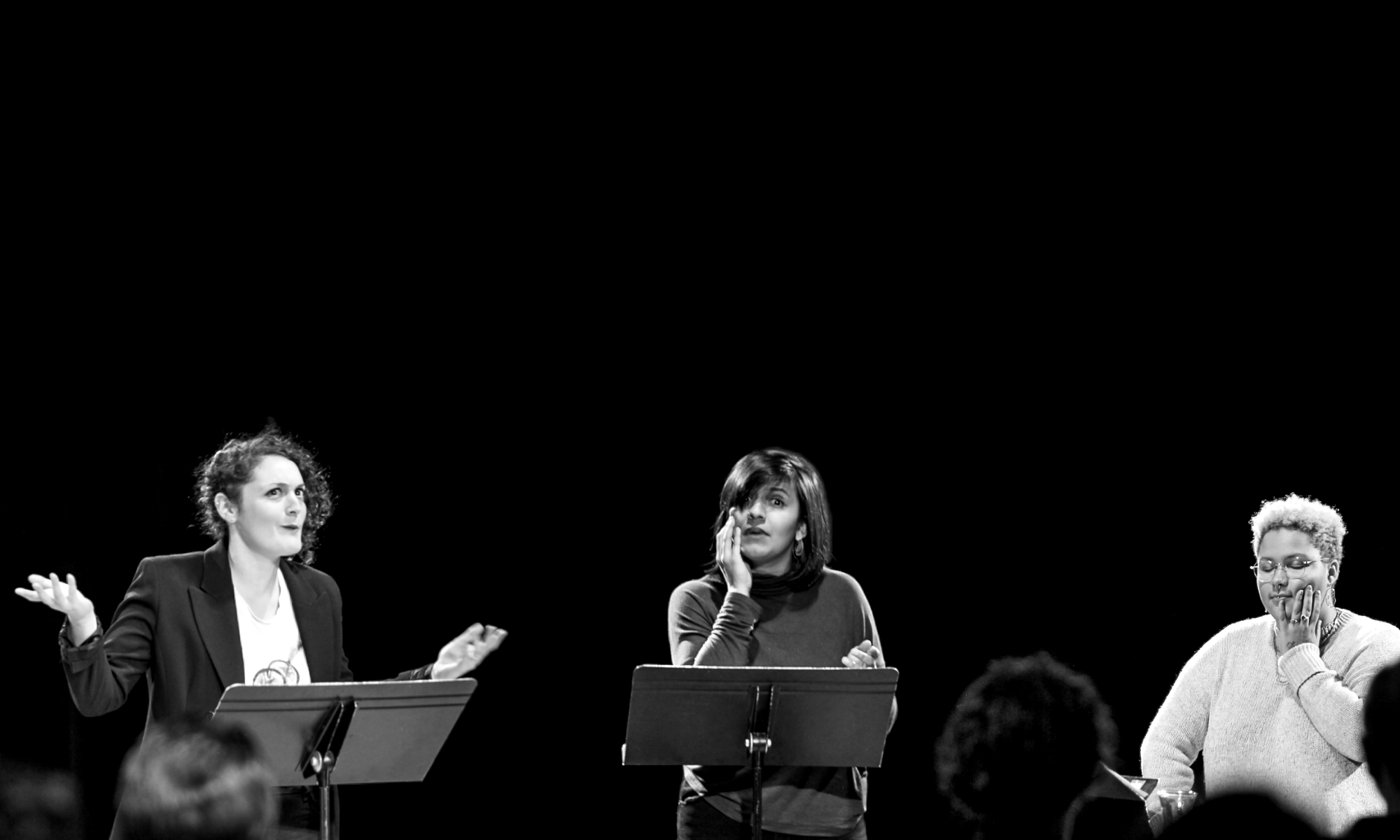The impact of play development goes beyond the walls of the theatre.
The buzz in the room was palpable as more than 40 members of the Montreal theatre community funnelled into the PWM studio for a pilot event unpacking the practice of dramaturgy. Démystifier le Processus Dramaturgique was conceived by Artistic & Executive Director Emma Tibaldo, as a conversation starter on how Montreal theatre artists and cultural workers understand dramaturgy both in theatre creation and in society. To kick off the evening were presentations from world-renowned dramaturgs Diane Roberts, Katalin Trencsényi and Jessica Carmichael, who offered detailed insight on their experience as guides creating theatrical work. Vice-President of the Board Tiffanie Guffroy then facilitated a community discussion answering the question “what elements make for a positive dramaturgical process?” The conversations were lively, personal and highlighted the deep impact a dramaturg can have on the creative process, an artist’s development and the effect a piece of theatre has on its community.
Each guest speaker offered a distinct lens on the act of dramaturgy: the ancestral, the societal and the personal. Director, writer, dramaturg and cultural animator Diane Roberts outlined her work on Arrivals Legacy Project, in which artists used research and imagination to explore the embodiment of an ancestor. Roberts was eloquent and spiritually invigorating as she articulated her and her collaborators’ process of mining the body for images and the residue of story passed on through DNA to find the “gaps in the archives.” She went on to describe how her team created scenarios where artists whose ancestors have had great historical conflict can embody the legacy of this conflict and meet safely, while living in the truth of the violence that has passed between them. It is clear that Roberts’s work speaks to the power the dramaturgical process can have on reconciling the plurality of histories that interact in a colonial city like Montreal.
Next was London-based dramaturg Katalin Trencsényi, who shared the work of Hungarian participatory art-based project Sajatszinhaz to illustrate the social impact of macro-dramaturgy (dramaturgy that has ramifications beyond the walls of the theatre). Sajatszinhaz’s work developing socio-dramas based on the hardships faced by the systematically oppressed Romani people of Hungary was outlined. Those who lived the experience the plays were based on were given the chance to act in the productions guided by Sajatszinkaz dramaturgs and directors. This work of empathy and empowerment through sharing stories was an astounding example of how the dramaturgical process can address the needs of the community and reform the structure of society.
The final presentation was from Abénaki/Euro theatre-maker and professor at Concordia University, Jessica Carmichael discussing her process as a dramaturg, which she described as a reflective practice of support. She outlined the importance of building a genuine connection with her playwrights which involves many phone calls and discussions about the artist’s life, all documented by Carmichael. She emphasized the profound effects small tweaks in the artists’ daily habits can have during creation “what are you listening to right now? What are you watching? Try listening to this, or watching that instead.” These detailed suggestions on the playwrights’ artistic process could only spring from Carmicheal’s personal understanding of their complete humanity. The richness of each process discussed combined to cast dramaturgy as an essentially communal act.
After a brief break that was charged with discussion, the community members present were then broken up into three groups to pinpoint the essentials of a positive dramaturgical experience. Those contributing represented a wide range of artistic backgrounds and encounters with dramaturgy. The conversation (like the entire event) was an act of dramaturgy in and of itself. We began with individual stories and reflections and then slowly built broader connections between everyone’s unique experiences. It was a difficult task given our time frame and the plurality of creative minds present. My particular group was divided on how personal one’s relationship with a dramaturg should be. At the end of the process, the three discussion groups reconvened and shared our findings; the sum of which focused on deep connection, compassion and genuine reflection.
Although the results of this discussion were by no means definitive, they gave voice to the countless possibilities for dramaturgy to engage and comprehend the human soul. It became clear that the many methods of dramaturgy can be united in a few common attributes (such as commitment, reflection, and inquiry), and simultaneously be as unique and broad in scope as the artists and communities who benefit from them. The most defined takeaway from the event was that dramaturgy is ultimately an act of community building. This was summarized best as Emma Tibaldo spoke at the end of the night of the intention of continuing this conversation with the Montreal theatre community, so we can curate an understanding of the process of creation not in isolation, but as a family of artists deeply committed to reflecting our shared humanity.
PWM will synthesize the information generated at Démystifier le Processus Dramaturgique into a manifesto for theatre creation. Stay tuned for that document in the new year! We will want your feedback, as the conversation is only beginning.



















